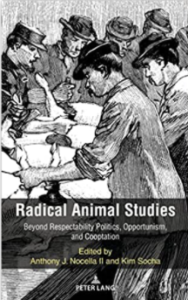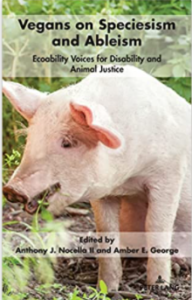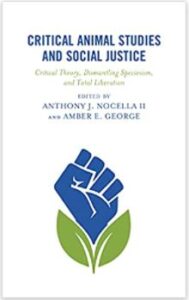Melissa Marie Legge
Possibilities for Collaboration: Challenging Anthropocentrism in Social Services
By, Melissa Marie Legge, PhD Candidate at the School of Social Work at McMaster University
Abstract
Contemporary social work in Canada often positions itself as a justice-oriented discipline, regularly situating itself in critical and anti-oppressive thinking and forging alliances with radical social movements. Withing the field, social workers themselves are often constructed as agents of social change. This is evidenced by the theme for Social Work Week in Ontario in 2014: “Champions of Positive Change” (OASW, 2011). Paradoxically, for the past several years, social work has been criticized by as highly anthropocentric by scholars within the profession. Hanrahan (2011) even describes anthropocentrism as a “central organizing feature of western social work” (p. 278). Anthropocentrism is a dominant discourse which can be described as the inherent privileging of human beings over other subjects because of their species membership. This does not just mean above other animals, but above all non-human parts of society, including the environment, spirituality and the supernatural, and technology. Walsh (2009) points out that professionals overwhelmingly have an anthropocentric perspective, where we only consider relationships among humans as significant. Fine (2010) reinforces this, stating, “In part, these blinders derive from a persistent ‘humanocentric’ perspective that recognizes only intra-species [human] contacts as significant” (p. 235). Despite prevailing unquestioned in social work, this discourse has been critiqued and deconstructed in many related fields. This is problematic for many reasons, not least among them the emergence and recent growing popularity of animal-assisted interventions and veterinary social work. Taylor et al. (forthcoming) state, “the ethical legitimacy of [animal-assisted therapies] rests on their willingness to understand animals as sentient beings with needs of their own, not just possessions or tools for humans to use” (n.p.). While the supposedly justice-oriented discipline of social work continues to conceptualize other-than-human animals as objects rather than subjects of our profession, scholars in other fields suggest that animals ought to be the bearers of universal basic rights (Donaldson and Kymlicka, 2011). The project of posthumanism is to critique normative anthropocentrism, otherwise referred to as “anthronormativity” (Giffney and Hird, 2008). How do we theorize the other-than-human subject in anthropocentric justice-oriented work, and how would that change if the posthumanist lens could be applied, particularly to social work? What would that mean for delivery of social services? How would this shift the reductive construction of other-than-human animals in shared social environments? Drawing on ecofeminist, queer, and posthumanist theoretical perspectives, this paper aims to address some of these questions and demonstrate the importance of disrupting anthropocentric thinking in contemporary social justice work to open new possibilities for collaboration with critical animal studies and animal liberation movements.
Bio
Melissa Marie Legge is originally from Newfoundland, but currently resides in Toronto, Ontario. She is a PhD candidate at the School of Social Work at McMaster University in Hamilton. For her doctoral research, Melissa will explore the well-being of humans and other animals in shared social environments through an analysis of the involvement of other-than-human animals in social work practice in Ontario. Scholars have not yet interrogated the way our social services and social work more broadly centres upon the human animal. Melissa hopes that her dissertation will begin to fill this gap by documenting how other-than-human animals are integrated into and neglected by social work practice. The aim of this research is to begin to create a critical conceptualization of animal-assisted interventions in social work in Ontario.





